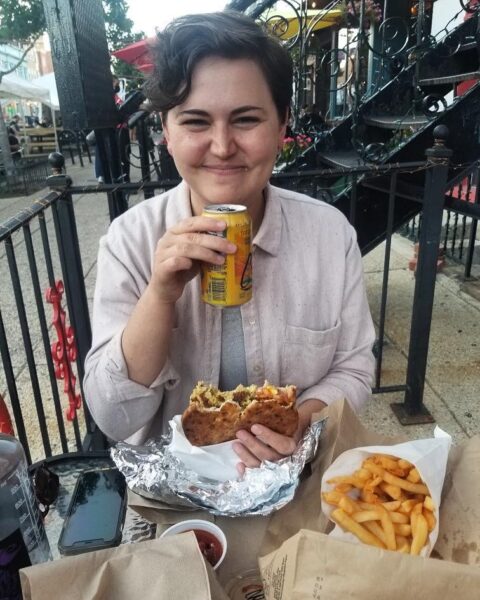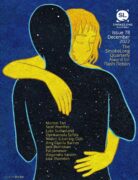Is there a significance to the story being in three parts (triptych, the holy trinity, three wishes)?
This is probably an unsatisfying answer, but no! Eddie, in Three Parts came together from bits and pieces of an unpublished novella. I see it as a sort of excavated character study. I should probably just take credit for having an intention behind the three-part structure, though. A triptych, sure, that sounds smart. Let’s go with that!
What is the borderline (for you) between erotic and literary writing?
Like most borders (literary or otherwise), the one between the erotic and the literary is mostly imaginary. Smut is subjective. If you look at this moment of trans- and homophobia we’re in, a lot of those people are basing their violence on the belief that trans bodies like mine are inherently sexual and deviant and therefore a threat to their larger white supremacist project. The usual counter response is to try and de-sex ourselves in the public eye.
So, what happens if I turn around and say yes, my understanding of myself is sexual, is erotic? I would not know myself without sex, specifically with other trans people. My life is erotic and so my work is erotic. I’m not interested in sanitizing that for the sake of those who deny their own pleasure.
How can clothes be a manifestation of identity (the first outward sign of gender that people see and those wearing the clothing that they experience)?
Clothes are one of the easier entry points for trying different gender presentations and exchanging old clothes with other trans people has been a really moving experience for me.
Seeing clothes that caused you pain bring someone else to life—that’s pretty sacred. It’s as close to a true T4T body-swapping fantasy as we can get right now (trust that Eddie would give Mel his tits if it were a medical possibility), and in the case of this story, it’s also an act of devotion. Eddie and Mel can’t switch bodies, but they can inhabit each other through their clothes. There is something deeply romantic about that.
In the story, Eddie interprets the word “faggot” as a compliment because he is delighted to be identified as a gay male when the word is used as a slur. Were you worried about using the term?
Not really. I live somewhere between faggot and dyke and it’s a comfortable space for me to exist in. Those words feel truer to my experiences than any other identity category. They’re exchanged freely and with affection in the company I keep, and honestly, I couldn’t imagine censoring them from my work.
I was a lot like Eddie in the early days of still jumping in and out of the closet, and that scene is lifted pretty directly from my life. A stranger on the street called me a fag and I practically wanted to thank them! It didn’t matter their intent because, more than anyone else in my life at the time, that stranger understood something fundamental about me. It felt like honesty.
I doubt this is an anecdote most people who aren’t trans can relate to and I don’t really care. I am not writing for a cishetero audience, so I try not to concern myself with legibility. Constantly worrying about bad faith interpretations is not serving my art.
I love this line, implying perhaps that it is more difficult to be a man for Eddie: “There were so many ways to be a woman.” Can you expand on that?
Eddie is trying to rationalize not transitioning in this scene. No matter how much he wants or needs to, it’s a terrifying thing to stare down, especially when you’re invested in the idea of masculinity being inherently evil, or at least inherently destructive. Becoming a man feels like betraying his morals, and his friend agrees. I wouldn’t say that being a man is more difficult for Eddie (pretending to be a woman was certainly much harder), but finding peace in his masculinity is.
People expressed this sentiment to me a lot when I came out, like, “Well can’t you just be a masculine woman? Why can’t you just be gay?” Of course, this line of questioning assumes that masc women are somehow exempt from having their gender policed, as though the image of an actual butch doesn’t strike fear into the fragile hearts of straight people everywhere.
And besides that, it precludes the possibility that someone might actually want to be a faggot. Not only existing as a gay man but actively desiring to be so is incomprehensible to a lot of people and that’s really sad. I’ll say it again: A man is a wonderful thing to be. A faggot is a wonderful thing to be.



 The SmokeLong Grand Micro Contest (The Mikey) is now an annual competition celebrating and compensating the best micro fiction and nonfiction online.
The SmokeLong Grand Micro Contest (The Mikey) is now an annual competition celebrating and compensating the best micro fiction and nonfiction online.